Environmental Stewardship

Last fall, on a Sunday afternoon, as I walked out of the church, a young man tugged on my Franciscan habit. It was Miguel, a member of our Latino choir.
“Father,” he said, “please, pray for the people of my home parish back in El Salvador, especially for one of the priests who has received death threats.”
Startled, I asked: “What is happening there?"
“These priests are organizing against the multinational companies,” he said. “The companies are looking for gold. What will be left for our people? Only poisoned water, a wasteland, and death.”
A few weeks later, I had another similar conversation with a group from Guatemala. Theirs was a similar tale of how indigenous communities were being threatened by mining projects.
As a Catholic and a member of the Franciscan Order, I believe that we are called to “read the signs of the times” and to listen to the cry of the poor and the “groaning” of God’s Creation.

When facing a crisis, silence is certainly easiest. But silence isn’t best. As we face some very challenging environmental issues, evangelicals must learn to begin to discuss the environmental crisis with creativity and integrity. Whether it’s because we know we play an integral role in the healing of the world, in agreement with Wendell Berry, who says our fate is “mingled in the fate of the world.” Or, because we’ve come to see our responsibility to care for God’s creation as a central aspect of our love of Jesus Christ. Regardless of our reason — silence can’t be our policy.
In a very real sense, the easiest way for us to deal with the realities of the 21st century ecological crisis is practicing a kind of mutual pretense. That’s the easiest thing to do. Despite the humming knowledge that hard things await, we will talk about anything without actually talking about what is going on. More than many, I know that this can be the practice of evangelical Christianity in which I am rooted. We’ll talk about the return of Jesus, about theology, about church practice, anything but what’s actually going on in our world.

SOON AFTER Dr. Michael Hendryx assumed a professorship of health policy management at West Virginia University, he started hearing stories of sick people in Appalachian communities near mountaintop removal coal mining operations. Finding no scientific research that examined the correlation between mountaintop removal and community health, Hendryx and his colleagues began overseeing family health surveys and compiling health data from the Centers for Disease Control and Prevention.
Since 2011, Peter Illyn of Restoring Eden (Christians for Environmental Stewardship) has recruited and led student volunteers from Catholic and evangelical Christian colleges in conducting door-to-door community health surveys for Hendryx’s research. Typical volunteer experiences, according to Illyn, include “aha” epiphanies and deepening conversions to God’s justice. Alex Gerrish, a recent Samford University (Birmingham, Ala.) graduate, recalls a searing experience. Her survey team visited a home located close by two mountaintop removal (MTR) operations, where a mother answered the door. She said, “I’m trying to get my son down for a nap,” explaining that her two-year-old had a heart defect. “Now’s not a good time to talk.” Two days later the team revisited the home to be met by an older, tear-stained woman. “I’m sorry,” she said. “My grandson passed away a couple days ago.” He never woke up from his nap. As Gerrish stood in shock, she recalled the statistics on high birth-defect rates in communities with mountaintop removal operations.
Now, more than two dozen published peer-reviewed studies show a high correlation between populations living amid MTR operations and very high rates of morbidity, asthma, chronic obstructive pulmonary disease, heart disease, cancer, and birth defects.

I'D ALWAYS HOPED that the president’s “all of the above” energy strategy was a mere campaign slogan, a way to avoid riling anyone up as he ran for re-election. But he’s made pretty clear that it’s actually his guiding light.
“The all-of-the-above energy strategy I announced a few years ago is working,” he crowed in his State of the Union address. And indeed it is, if the goal is to drill, baby, drill. In Obama’s time in office, U.S. oil production has increased 50 percent; analysts estimate that by the time he’s gone in 2016, we’ll have literally doubled the amount of oil we produce in this country. The curve for natural gas production has been almost as steep, and though we’re burning less coal in our own power plants the amount we export has hit record highs.
In political terms, Barack Obama holds us environmentalists at bay with pretty words on climate change, but when it comes time to drill he’s the go-to guy. As he told a crowd of cheering oilmen in Oklahoma during the last campaign, “over the last three years, I’ve directed my administration to open up millions of acres for gas and oil exploration across 23 different states. We’re opening up more than 75 percent of our potential oil resources offshore. We’ve quadrupled the number of operating rigs to a record high. We’ve added enough new oil and gas pipeline to encircle the Earth and then some.”

At Trinity United Church of Christ in Chicago, members and neighbors buy fruits and vegetables from a black farmers market and work in an organic garden named after botanist George Washington Carver.
They recycle their church bulletins, plan to renovate their building with a “green” roof and have purchased 27 acres for a community project that will include an urban farm.
“By any greens necessary,” the Rev. Otis Moss III, the church’s pastor, likes to say.
When it comes to African-American churches and a focus on the environment, Moss and his congregation are the exception rather than the rule.
Moss said many of his black clergy colleagues are less interested in conservation and tell him: “That’s your thing.”
Black congregations have tended to focus on their members’ basic needs — getting jobs, rearing children, pursuing higher education.
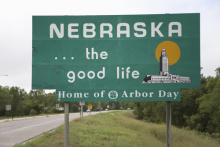
Deuteronomy 8 says “the Lord your God is bringing you into a good land, a land of flowing streams, with springs and underground waters ... a land where ... you shall bless the Lord your God for the good land he has given you.
When you arrive in Nebraska, signs on the interstate will welcome you to “The Good Life.” The folks who came up with our unofficial state motto may or may not have had the passage from Deuteronomy in mind, but to witness Nebraskans’ love for their land is to understand that it is a quietly sacred connection.
That connection found its voice in Nebraska citizens’ four-year battle to stop the TransCanada pipeline. In face of the threat of oil spills polluting the underground Ogallala Aquifer, of construction spoiling the fragile Sandhills region, and of a foreign corporation using bully tactics to seize landowners’ property, a remarkably diverse coalition of farmers, ranchers, environmentalists, Republicans, Democrats, Independents, grandmothers, students, and citizens took hold to protect Nebraska land.

This week, Secretary of State John Kerry spoke more forcefully about the urgency of climate change than he has before publically, likening it to a weapon of mass destruction. Apparently, such words did not sit well with Sen. John McCain, a politician who was once a pioneer in the political fight against climate change. In response to Kerry, McCain asked, “On what planet does he reside?”
For some context: Kerry has been traveling worldwide. He made his climate change speech in Indonesia, a nation made up of islands that are already experiencing the impacts of climate change. Climate change isalready contributing to changes in rainfall in the country, with serious droughts and flooding, and the threat of significant sea level rise. Furthermore, Indonesians seem more aware of climate change than we are — no surprise given its impact on their entire country. In its Climate Asia project, the BBC found that 63% of Indonesians said the number of trees had decreased and 74% believe that climate change is happening (compared with 68% of Americans). Kerry was speaking about an imminent problem to a nation where most people are aware of that problem.
Don’t let the media tell you that nothing is going to happen in Washington this year. Sure, Congress may be gridlocked on major legislation as we approach midterm elections, but key decisions are set to be made that will define President Barack Obama’s legacy on climate change. In the coming months, the Environmental Protection Agency is finalizing carbon pollution standards for both new and existing power plants, and the Obama administration will make a final decision on the Keystone XL pipeline.
Because the impacts of climate change, such as drought, more severe weather, flooding, and crop devastation, are more harmful to the world’s poor, these decisions will affect the lives of vulnerable people everywhere. As a Christian, I cannot sit idly by while God’s children are suffering from the devastating effects of irresponsible environmental degradation. I am joining with other people of faith in articulating the moral urgency of caring for God’s creation.
If you think it’s impossible to change evangelicals’ views on climate change, think again.
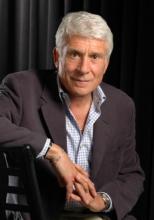
A new film charting Charles Darwin’s passage from Christian to nonbeliever propelled its maker on a similar journey.
“Questioning Darwin,” a new, hourlong documentary airing on HBO throughout February, juxtaposes the story of the 19th-century British naturalist with looks into the lives of contemporary American Christians who believe the world was created in six days, as described in the Book of Genesis.
Antony Thomas, the 73-year-old British filmmaker behind the camera, said while his goal was to highlight the way his subjects answered big questions about the origins of life, a loving God, and the purpose of suffering, he found his own answers to those questions changing.
“This is a personal feeling, but I do believe the two [a belief in God and in evolution] are not compatible,” Thomas said by telephone from New York, where he is working on another documentary. “And that is what made this worthwhile for me.”
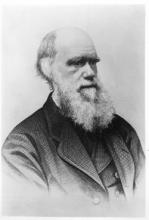
Happy Darwin Day! A time to play pin the tail on the sparrow, partake of “phylum feasts” (potluck dinners where the ingredients come from many different species), and generally give a thumbs-up to evolution’s godfather, Charles Darwin, on his 205th birthday, Wednesday.
A growing number of Americans of varied religious backgrounds are marking the 1809 birthday of the British naturalist whose masterpiece “On The Origin of Species” has never been out of print since its publication in 1859.
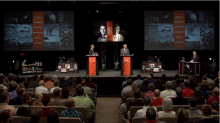
There was a moment during last week’s “debate” between Bill Nye the Science Guy and young-earth creationist Ken Ham that I think was more telling than any other.
During the Q&A session, Ham was asked what seemed to me to be a very simple question: “Hypothetically, if evidence existed that caused you to admit that the universe is older than 10,000 years and creation did not occur in six days, would you still believe in God, and the historical Jesus of Nazareth, and that Jesus was the son of God?”
What was most telling was not really what Ham said, as much as what he didn’t say, which was “Yes.”
In my mind, this question was a softball pitch. It couldn’t possibly be easier. And Ham was given two minutes to answer the thing? His response should have taken all of two seconds: “Yes.”
The U.S. needs to quit its crude oil habit. TransCanada needs to see the individuals whose health is directly threatened by Keystone XL. The president and legislators alike need to act for the welfare of not only this generation but for the generations to come, if we indeed want to see the flourishing of future generations. We need to admit to our addiction to oil and identify its harmful ecological impact for what it is.
As a person of faith, I want to see our landscapes, waters and skies restored to wholeness. I am compelled by the love I’ve received from God and God’s people to work alongside others for the common good of all. Having experienced the crisp June evenings of Minnesota as well as the asthma-inducing smog of Hong Kong, I know both the beauty of fresh air and green spaces and the dullness of pollution and gray skies. The chances of enjoying the former are quickly dwindling at our current rate of oil consumption, but we still have time to prevent further environmental degradation, if not for future generations then at least for those of us who still look forward to the rest of their lives, no matter our age.

If you perused some of the headlines coming out of Slate the past couple weeks, you’ll find that, not only are Texas schools teaching creationism , schools all over the country are teaching creationism , and — even as we speak — lawmakers in South Dakota and elsewhere are introducing legislation that will let their schools teach creationism.
Such news leads me to one of two conclusions: Either the proponents of teaching creationism — a viewpoint I thought it was ruled unconstitutional by the Supreme Court in 1987 — have been very busy lately, or what passes for “creationism” in the eyes of the mainstream media these days has become pretty fuzzy.
I lean toward the latter.
Look, I’m a writer and a journalist, too. I get it. I understand the desire for a sexy, emotionally heavy word that “seems” to describe the given topic and will — of course — generates millions of clicks from the churning, polarized body politic that powers the Interwebs.
But this willy-nilly misapplication of the terms “creationist” and “creationism” simply has got to stop, and here’s why.

Friday at 3 p.m. ET, the State Department released their long-awaited final Supplemental Environmental Impact Statement of the Keystone XL pipeline extension, a proposed project from TransCanada to build a new pipeline for transporting tar sands crude oil from Canada to a refinery in Texas where it will likely be exported internationally.
Environmentalists and concerned citizens on the pipeline’s pathway have been waiting for the State Department to address previously ignored issues like the pipeline’s impact on climate pollution. President Obama said in a climate-focused speech last year that he would only approve Keystone XL if it did not pose a significant risk of climate pollution, so although State Department looked at other environmental risks as well (such as the 1,692 pipeline spills or incidents that occurred from 2002 to 2012 in the United States). This review concludes that the number of U.S. jobs to be created – once estimated in the tens of thousands – will actually be 50 operations jobs, with only 35 permanent. The rest (the touted 42,000 number) are all temporary construction jobs.

IN 2013, Sojourners commissioned a messaging study to contribute to the creation care movement—the Christian response to climate change. We polled nearly 1,100 people, oversampling for evangelical Christians, since evangelicals can be politically effective when activated on justice issues, as they have been on immigration, HIV/AIDS, and human trafficking.
Our goal was not only to learn evangelicals’ attitudes about climate change, but also to explore which messages are most compelling so we can better communicate on the issue and make an effective difference for God’s creation.
The first thing we learned was that many of the common stereotypes about evangelicals and climate change simply aren’t true. For one thing, the majority of evangelicals we surveyed (60 percent) agree that climate change is happening, and most say that human activity plays a role.
Second, one’s position on climate change is better predicted by political affiliation than by religion but, interestingly, evangelical Republicans are more likely to support action on climate change than non-evangelical Republicans. Young evangelicals are also more receptive to climate change messages than non-evangelical young people. And for those who don’t agree with us on climate change, there is a low level of certainty: Twenty-five percent of evangelicals are in the moveable middle, either “somewhat sure” that climate change isn’t happening or undecided. This means there’s a good chance that they already care, or that their opinion could be changed.
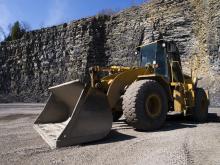
WEAK LAWS AND empty regulations in Canada allow Canadian mining companies to flourish in every corner of the world: Papua New Guinea, Chile, Argentina, Peru, Mexico, the Dominican Republic, all over Africa—anywhere local conditions are favorable for producing “low cost” metals; that is, any country where local government control mechanisms are weak or nonexistent.
Today, Canadian companies account for 75 percent of mining worldwide, and their practices are rife with abuse. The companies promise sustainability, responsibility, and a “win-win” situation for all, but there is a fundamental contradiction between their claims and the reality of massive open-pit, cyanide heap-leach mining, which devastates surrounding communities and the environment.

Bill Nye may be “The Science Guy,” but Ken Ham is the “Answers in Genesis” man, and a debate between the two over the origins of life has nonbelievers and Christians wringing their hands.
Nye, host of a beloved television science series, and Ham, president of a creationist apologetics ministry, will meet at the Creation Museum, where Ham is also the president, on Feb. 4. In what some wags are calling “the Ham-on-Nye debate,” they will weigh this question: “Is creation a viable model of origins?”
In truth, both sides answered that question long ago — Nye with Charles Darwin’s work on the origin of species and Ham with the first book of the Bible. Yet many observers — both religious and nonreligious — say the debate is a very bad idea.

Energy policy and climate change action are inexorably linked, like two oxen in a yoke.
The trouble with this set-up is that while climate action tends to look straight ahead, energy policy is apt to veer off on any number of paths, some of them quite well-meaning, like job growth or “energy independence.”
Last night’s State of the Union address by President Obama was, I’m afraid, one such experience for climate action, which compared to the huge bull of energy issues is a yearling at best. The yoke between energy and climate did get mentioned by the president, but the yoke pressed toward economic growth, the paradigm which many argue is responsible for our ecological crisis in the first place. It’s enough to strain a vertebra.

After two doves released by Pope Francis and two young children were attacked by aggressive predator birds, a leading animal rights group called on the pontiff to stop what they called “outdated traditions.”
The Vatican regularly releases doves as a symbol of peace, and in multiple instances they have been chased and sometimes captured and killed by more aggressive fowl in the area. But Sunday’s events were more noteworthy because the scene of a seagull and a crow swooping in to attack the doves was captured by several of the photographers in St. Peter’s Square as a crowd of tens of thousands — including several thousand children — looked on.
Both white doves managed to escape their predators after a brief tussle, but it’s unclear what ultimately happened to them.